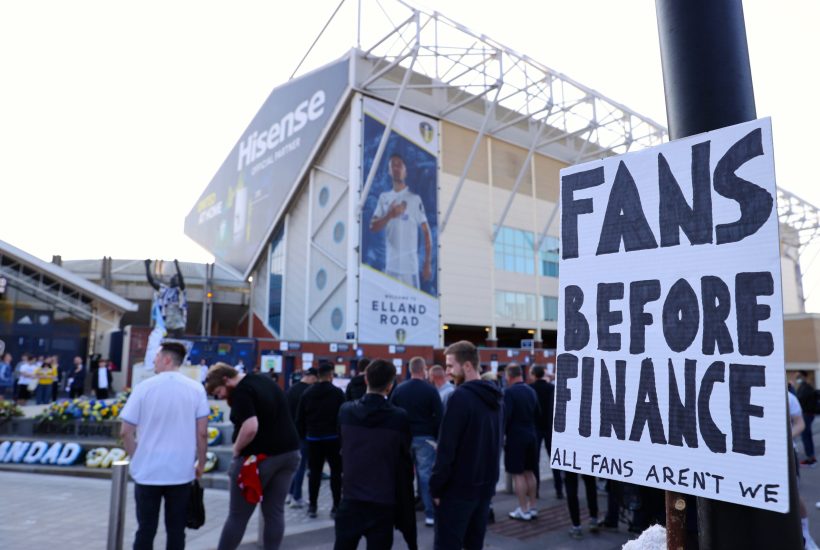Many are blaming the failed European Super League on foreign owners, presenting it as a greed fuelled attempt by overseas banks and businessmen to ruin the beautiful game.
The BBC’s political correspondent Ian Watson framed the disagreement as ‘a battle between football fans on the one hand and the predominantly overseas owners of big clubs on the other’. Similarly, the Football Supporters Association has said the proposals were being pushed by ‘foreign owners who are basically asset managers who can see a way of making massive amounts of money out of this’.
There’s nothing inherently evil about foreign owners of football clubs, or foreign owners of any other business for that matter. Highlighting foreignness to explain disagreeable behaviour should surely only be done when there is a solid evidential connection between the two. The only difference between foreign owners and British ones is that they are not subjects of Her Majesty. But if they’re operating here, they’re subject to our rules.
Foreign owners provide the capital to bring in new talent and provide renewed vision. They finance stadium upgrades, training facilities, and transfer market pick-ups. This also places competitive pressure on domestic owners to invest in their clubs, providing further benefits to the sport. The global interest in the clubs should be celebrated as a national achievement that hugely benefits football and Britain. Just as English football would be worse off without foreign coaches and players, it would not be anywhere near as successful without foreign owners.
Foreign owners may do this in the pursuit of profit — but unless you’re against free enterprise, you’ll agree that there’s nothing wrong with profit. A profitable club is a successful club, one that is attracting talent and fans. Those same coaches, and indeed the footballers themselves, tend to work at top league clubs because they benefit financially from that employment rather than primarily for the love of the fans.
In many cases, however, football clubs are vanity projects that barely turn a profit. Alan Sugar, former chairman of Tottenham Hotspur, once described owning a football club as ‘drinking prune juice while eating figs’. So, when a foreign owner purchases a club they are often taking money out of their own pockets to support a club. It’s hard to see how that leaves fans worse off.
Last year, 13 of the 20 Premier League clubs were majority foreign-owned. The main complaint against foreign ownership is that these profit-seekers lack links to the local community and woefully corporatise the game. If anything, recent decades have proved the opposite: the game has become more professional and clubs are investing in better infrastructure. Meanwhile almost every club in the league has a growing youth team to foster domestic talent. A boon for local fans and quality of play.
English football is now a global game: it is broadcast to 643 million homes in 212 nations. The sport links Britain to the world and unites people across borders in a common cause. It is a perfect exemplar of old-style Labour internationalism, bringing together the global working class, and Tory ‘Global Britain,’ linking people through trade and enhancing the UK’s reputation. Football fans of the world, unite!
In response to proposals for a European Super League, the government reportedly considered introducing the German model, which requires clubs to be majority-owned and controlled by members. This is a proposal that would damage the clubs and, ultimately, the fans by reducing investment in the game. It’s worth remembering why English football is a truly global game in a way German football is not.
The fight over the European Super League was really a battle between football clubs and existing leagues. The proposal backfired by alienating audiences who enjoy the unpredictability of the current system, which sees clubs promoted and relegated year-to-year. The profit motive proved self-correcting, proving that the clubs are dependent largely their fans. The new league enraged supporters and thus could not go ahead. The clubs could also not afford to lose access to the highly profitable domestic leagues.
Ultimately these matters were resolved by the owners, who are put their capital on the line to support the game. It did not necessitate state intervention for the clubs to change course. Even foreign owners must keep their fans satisfied.
<//>
Got something to add? Join the discussion and comment below.
Get 10 issues for just $10
Subscribe to The Spectator Australia today for the next 10 magazine issues, plus full online access, for just $10.




















Comments
Don't miss out
Join the conversation with other Spectator Australia readers. Subscribe to leave a comment.
SUBSCRIBEAlready a subscriber? Log in